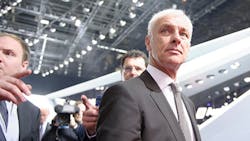VW: We Didn't Expect EPA to Go Public So Quickly
FRANKFURT, Germany — Volkswagen believed it could have amicably cleared up emissions-cheating allegations with U.S. authorities, and was instead caught off guard by public statements, according to a key company document revealed Monday.
“The public announcement of the diesel issue by the (Environment Protection Agency) ... came as a surprise for the VW management at the time,” according to the company’s official written response to a lawsuit by German shareholders.
A copy of the 113-page document, which offers an update on the facts compiled so far in VW’s own investigation into the global scandal, was obtained by AFP. It was drawn up by the company’s lawyers as an initial statement of defense against accusations that it deliberately withheld market-sensitive information from investors.
On top of still unquantifiable regulatory fines in a range of countries related to its ongoing emissions-cheating scandal, VW is facing a slew of legal suits, notably in the United States and Germany, from angry car owners. Shareholders are also seeking damages for the massive loss in the value of their stock.
They accuse VW of violating capital market disclosure rules, saying the carmaker knew about the irregularities long before the scandal broke and should have informed shareholders much earlier because they must have known it would affect the share price.
But according to the defense document, VW insists that the German shareholder lawsuits are “without merit” and that until “the violation of U.S. environmental regulations was announced” on Sept. 18, “there were no indications whatsoever of information with relevance for the stock price.”
U.S. authorities had never unilaterally decided to go public with similar accusations against other carmakers, VW argued.
On the contrary, even when allegations of potential violations of the U.S. Clean Air Act had been made, normally an appropriate solution was found with the U.S. authorities behind closed doors.
“In the past, even in the case of so-called ‘defeat device’ infringements, a settlement was reached with other carmakers involving a manageable fine without the breach being made public,” VW argued. “And in this case, the employees of Volkswagen of America had the impression on the basis of constructive talks with the EPA that the diesel issue would not be made public unilaterally but that negotiations would continue.”
At that stage in September 2015, the negotiations between VW’s American subsidiary and the U.S. authorities had already been going on for more than a year.
VW’s lawyers also sought to exonerate the group’s management in the affair, including former CEO Martin Winterkorn and other board members, current supervisory board chief Hans Dieter Poetsch among them.
The company conceded that discussions had been held and memos exchanged at top management level, but the issue was simply one of a number other issues for board members.
In the summer of 2015, Winterkorn ordered an investigation into the matter, but “individual technicians attempted to stonewall these internal reconnaissance efforts,” the report said. VW has insisted from the beginning that a small group of engineers was behind the scam.
The carmaker has begun making the necessary technical adjustments to the affected engines in Europe, but not yet in the United States where the necessary discussions are still ongoing.
Copyright Agence France-Presse, 2016
About the Author
Agence France-Presse
Copyright Agence France-Presse, 2002-2025. AFP text, photos, graphics and logos shall not be reproduced, published, broadcast, rewritten for broadcast or publication or redistributed directly or indirectly in any medium. AFP shall not be held liable for any delays, inaccuracies, errors or omissions in any AFP content, or for any actions taken in consequence.
